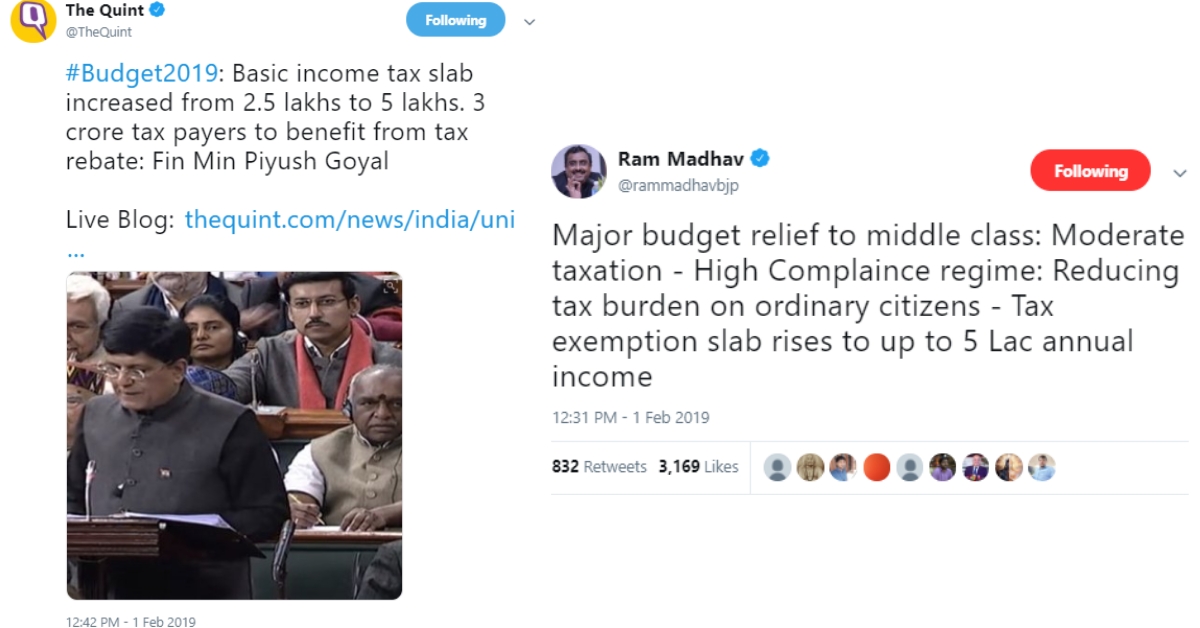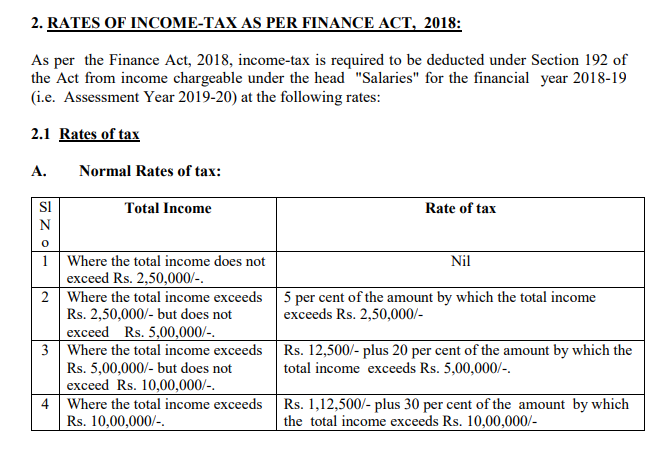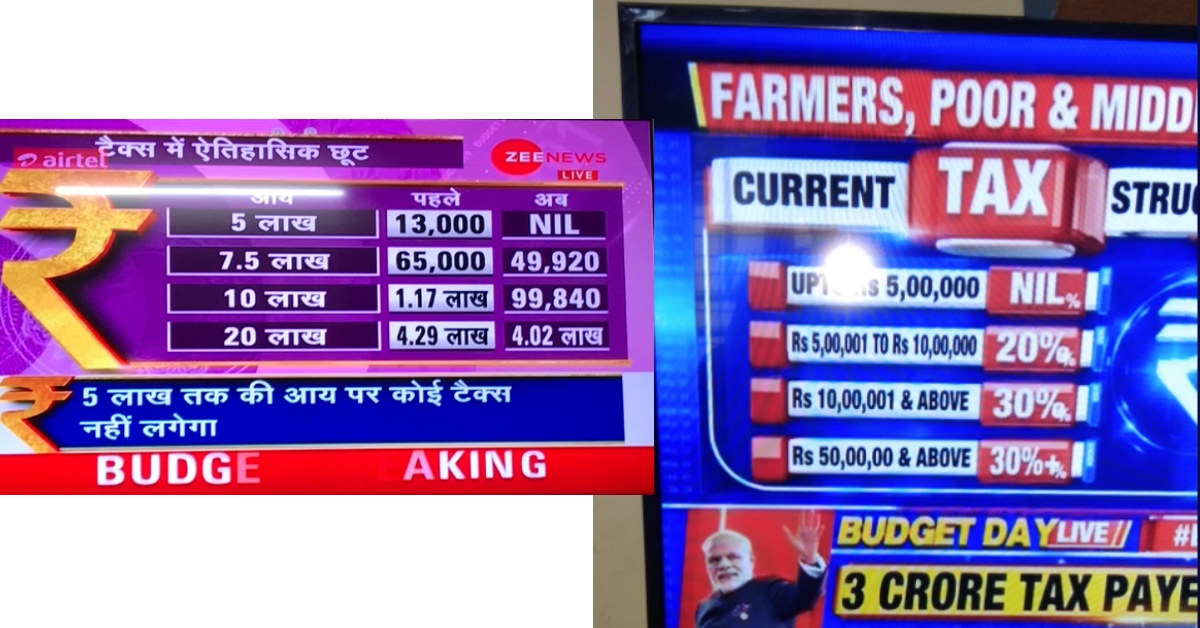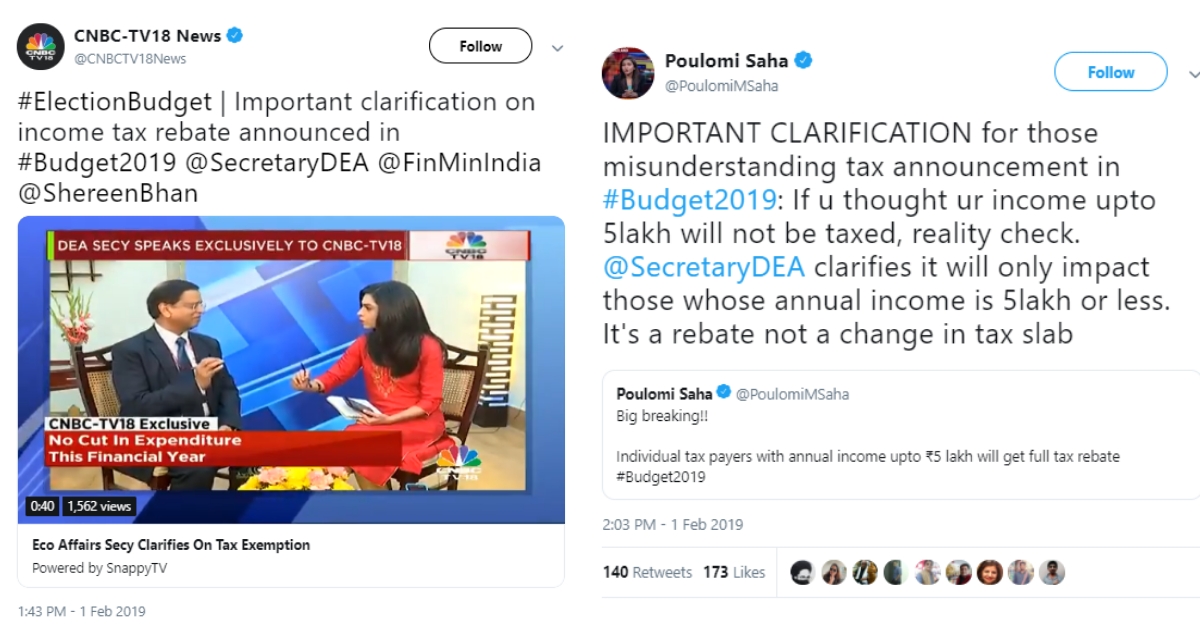Union finance minister Piyush Goyal presented interim budget 2019 in the Lok Sabha on February 1, with major proposals aimed at the unorganised sector and the middle-class. One of the most talked about sops announced by the government was the relief proposed for middle-class taxpayers. This was widely perceived as a change in tax slab, with taxable income up to Rs 5 lakh to fall under “tax exemption” category.

However, there have been no proposals to alter the existing tax slabs.
What does the interim budget say on taxes?
The finance minister said in the Lok Sabha – “For the present, the existing rates of income tax will continue for FY 2019-20 also. I propose the following changes – Individual taxpayers having annual taxable incomes up to Rs 5 lakh will get full tax rebate.”
#BudgetWithNDTV | “Individual taxpayers having annual income upto Rs 5 lakh will get full tax rebate”: @PiyushGoyal in #Budget2019 speech
Track updates here: https://t.co/3kzbcp8SBO
Follow special coverage on https://t.co/ckvRk4CUuH and NDTV 24×7 pic.twitter.com/K3OHXKLk36
— NDTV (@ndtv) February 1, 2019
This means that the government has NOT proposed to change tax slabs by including taxpayers earning up to Rs 5 lakh under the “exempt” category. It has, in fact, proposed to give them a full rebate in case they pay more than their tax liability.
According to the current tax slabs (which are to continue for FY 2019-20), individuals with an income of up to Rs 2.5 lakh do not need to pay taxes.
When the total income exceeds Rs 2.5 lakh but not more than Rs 5 lakh, taxpayers are liable to pay 5% tax on the amount exceeding Rs 2.5 lakh. For instance, if your taxable income is Rs 3.5 lakh, you are required to pay a 5% tax on Rs 1 lakh.
If the total income is more than Rs 5 lakh per annum, not exceeding Rs 10 lakh, the tax liability is Rs 12,500 plus 20% on the amount over and above Rs 5 lakh. This means that if you earn Rs 7 lakh annually, you are required to pay Rs 52,000 (12,500+20% of 2,00,000) in taxes.
Where the total income exceeds Rs 10 lakh, the tax liability is Rs 1,12,500 plus 30% on the amount over and above Rs 10 lakh.

The aforementioned slabs will remain in their present form, while the government has proposed to give a full rebate to individuals earning up to Rs 5 lakh taxable income. This does not mean that only the income exceeding Rs 5 lakh will be taxed by the government. An individual earning Rs 7 lakh would still need to pay taxes on Rs 4.5 lakh as the Indian tax system allows tax exemption only up to Rs 2.5 lakh.
How is tax rebate different from tax exemption?
Tax exemption is the income, expenditure and investment on which no tax is levied (up to Rs 2.5 lakh).
Tax rebate, on the other hand, is a relief provided in the form of a refund on taxes in case an individual pays more than his tax liability. Section 87A of the Income Tax Act provides a rebate of Rs 2,500 or the tax payable (whichever is lower) for individuals with total income not exceeding Rs 3.5 lakh.

The government has proposed a change in Section 87A. Finance minister Piyush Goyal recommended a full rebate to taxpayers earning up to Rs 5 lakh taxable income. This means that the taxpayer can get a tax rebate of Rs 12,500 (5% of Rs 2.5 lakh).
In his speech, the finance minister also said that any person having a gross income up to Rs 6.5 lakh will not be required to pay any taxes.
Tax calculation up to Rs 6.5 lakh
Section 80C of the Income Tax Act permits a maximum amount of deduction of up to Rs 1.5 lakh on tax-free investments like life insurance, provident fund, LIC mutual fund, Sukanya Samridhi Account, etc. Tax deductions are reductions from a taxpayer’s gross income so as to lower the amount subject to tax.
If an individual earns Rs 6.5 lakh per annum, they can claim a tax rebate on Rs 5 lakh and invest the remaining Rs 1.5 lakh in tax-free investment options. In essence, they will not be paying any tax on their gross income of Rs 6.5 lakh.
The Income Tax Act, however, allows deductions over and above Section 80C. Moreover, the government has also proposed to increase the standard deduction limit to Rs 50,000.
Standard tax deduction for salaried persons raised from 40,000 rupees to 50,000 rupees: FM Shri Piyush Goyal #Budget2019 https://t.co/bwq6afFrrs
— PIB India (@PIB_India) February 1, 2019
Standard deduction allows for a flat deduction from income of salaried persons toward expenses that would be incurred in relation to their employment. It falls under Section 16 of the Income Tax Act. In 2018, it was set at Rs 40,000 and has now been proposed to be increased by Rs 10,000.
What would be the total deductions after the new proposals?
Apart from deductions allowed under Section 80C (Rs 1.5 lakh) and proposed standard deduction (Rs 50,000), a taxpayer also enjoys other deductions under various sections of the Income Tax Act.
Section 80CCD(1B) states, “As per section 80CCD(1B), an assessee referred to in 80CCD(1) shall be allowed a deduction in computation of his income, of the whole of the amount paid or deposited in the previous year in his account under the pension scheme notified or as may be notified by the Central Government, which shall not exceed Rs. 50,000.”
Section 80D allows deduction in respect of health insurance premium for self and/or family members. The maximum deductible amount is Rs 25,000 and in case of a senior citizen in the family, the limit is Rs 50,000.
Lastly, Section 80TTA provides a maximum deduction of Rs 10,000 (to non-senior citizens) on income earned by way of interest on deposits (not being time deposits) in a savings account.
According to an Economic Times analysis, a salaried person with an income of up to Rs 7.75 lakh would pay zero taxes if s/he avails the aforementioned deductions and rebate.
No change in tax slabs
The interim finance budget does not propose any changes in tax slabs but expands the scope of tax rebate (Rs 12,500 from Rs 2,500) and standard deduction (Rs 50,000 from Rs 40,000).
However, the changes were branded as “tax exemption” by many, including BJP MLA CT Ravi and media outlets like Reuters, The Telegraph and The Hindu Business Line. Zee News and Times Now ran misleading broadcasts claiming that the government has proposed to alter the existing tax slabs.

After the initial misreport, some news organisations and journalists clarified the faux pas (1, 2).

Independent journalism that speaks truth to power and is free of corporate and political control is possible only when people start contributing towards the same. Please consider donating towards this endeavour to fight fake news and misinformation.




